- Home
- Belva Plain
Homecoming Page 6
Homecoming Read online
Page 6
“You’re tired,” she said.
“I am not,” he answered, never wanting to admit that he was.
“Yes, you are. I can tell by your grumble. You’re tired, and this invitation has upset you besides.”
“Well, it’s made me think. It’s brought back things that I’ve tried to bury. Why, Mark doesn’t even go to the synagogue anymore. I asked him.”
“Mark knows who he is. He discusses it freely. He’s Jewish, but secular.”
“Secular! Where in blazes is the good in that?”
Brenda sighed. “Where the good is, I can’t answer. It doesn’t seem like much good to me. But it’s life, the world today, or part of it. And there’s nothing you can do about it.”
“I wonder what’s going to happen to the children. Look at them. So beautiful.”
In a double frame on the piano, they sat: Freddie, not yet two, was holding a ball, and pleased with it, smiled, showing his tiny teeth; Lucy, just six, had light, ruffly hair and a ruffly dress; her smile was piquant, already feminine.
“They both look like my mother,” Brenda said. “Take after her side.”
“So beautiful,” Aaron repeated, his eyes going moist. “Yes, but what’s to become of them, what will they be?”
“I suppose Ellen’s side thinks about it too. At any rate, there’s nothing we can do about that, either, Aaron.”
For a few minutes neither spoke. The little table on which they had their meals had been placed at the window so that they might look down at the park. From this height the skating rink looked like a mirror speckled with moving black dots.
“It doesn’t seem cold enough to be skating,” observed Brenda.
“Artificial ice.”
“Did I mention that Ellen’s painting is going to be shown in one of those galleries near their apartment?”
“You told me.”
He knew she was making conversation. His morose humor, his dwelling on the old subject, were not fair to her. And forcing a bright tone, he said, “I think she has talent. Those landscapes she does are really pretty.”
“That’s just what’s wrong with them. They’re too pretty. They’re only skillful imitations of Winslow Homer’s country scenes. She even has a deer in the last one.”
“Don’t disparage it. I liked it.”
“Darling, excuse me, you’re a marvelous surgeon, but you really don’t know the first thing about art.”
Aaron waved his arm toward the farther wall, on which, above a grouping of stainless-steel-and-leather chairs, there hung an enormous painting of acid-green and bloody-purple tubes, snaked around each other.
“And you do? And that’s art? It looks like intestines.”
“Aaron! It happens to be very, very fine art.”
“Bunk. You’re reacting against a reaction. You like this abstract stuff because your parents ridiculed it.” And he laughed, glad to have something to laugh about.
“Well, laugh away. It’s good to see you being funny.”
“Incidentally, how is it that you admire Annette Byrne’s things? If you like the stuff in this room, you can’t like her Chippendale.”
“Well, I don’t like Chippendale. But her things are good of their kind, and they’re put together with taste.” She reflected, “Ellen has taste, too, along with her other good qualities.”
Aaron nodded. “True. True. Listen, you don’t have to persuade me to go. Save your energy. I’m going next week. I don’t look forward to it, but I’ll do it. Call up and tell her we’ll be there.”
“No, I’ll write. When you receive a letter, you answer with a letter. That’s proper. They’re very proper people.” And suddenly, a dark expression passed across Brenda’s face. “You know what? It’s only the father who puts a bad taste in my mouth.”
“You just met him once.”
“Yes, and that was once too often. I felt such anger, the only time in my life I felt such anger. It stuck in my throat. I hated him.”
“The feeling was mutual, you can be sure.”
“Shriveled like a prune, his dry lips, and his eyes like pins pointed into my eyes. Who does he think he is, the duke of Westminster or somebody? The duke would be more gracious.”
“Not if his daughter had run off and married our son, Brenda dear.”
They both laughed. Then Brenda said seriously, “If I should ever run into him someplace, I’d—I’d make a scene. I don’t know what would happen.”
“You’d get your name in the papers, that’s what would happen. Not that I wouldn’t mind joining you. He looks down on our Mark! Mr. Hitler. He only needs a mustache to look like him.”
“Tell me. How does a girl like Ellen come from such a father? And how does a woman like Annette have such a son?”
“God knows. Maybe it’s in the genes. Don’t ask me, I’m not a psychiatrist, or God either.” Aaron stood up and shoved his chair toward the table. “Come on, enough of this. If you still want to go to the movies, I’ll stack the dishes in the washer while you repair your face. Hurry, or we’ll be late.”
“Aaron, I just had a horrible thought. You don’t think she’d have that man there, would she?”
“What man?”
“Ellen’s father.”
“Are you out of your mind? Of course she wouldn’t. By the way, don’t forget to pick up a little something to take along.”
“I know. Mark told me what bakery to go to on the East Side. Annette likes chocolate macaroons.”
Chapter 6
At four o’clock in December, the short, dark afternoon was over. Electric light filled the enormous room, glaring above the rug on which Freddie played with his blocks and Lucy, sprawled on her stomach, studied the first-grade reader. It shed a softer light on the easy chairs and bookshelves at the far end of the room, brightening the easel with the unfinished painting at the north window. And, at the opposite end, it brightened, too, the stove, the sink, and the ironing board, where Ellen was at work.
Despite the short afternoon it had been a long day. The days began around six o’clock when, from the other side of the partition that divided one space into three small sleeping rooms, there sounded Freddie’s early stirrings in his crib. First came a chirping sound, part speech and part song; what thought could he be expressing and from what heard music came those few sprightly notes? Next came the rattle and pounding of the crib as he propelled it back and forth against the partition. Last came his demanding call for attention, meaning a diaper change and breakfast. There was no use, even on a holiday or Sunday, in covering one’s head with the blankets, no escape from that demanding call. It was time to get up.
“Rise and shine,” Ellen’s father used to say when it was time for school. And now that was her own morning greeting to her own children. Funny, she reflected, how you trail all these tag ends, this miscellaneous baggage, along, even when you move from your first life into another one that’s removed one hundred eighty degrees.
She still used her mother’s linen place mats, even though she had to iron them herself. They were too precious to bring to the Laundromat, as were the handmade dresses that Gran bought for Lucy. Lucy had few occasions to wear them, but they were lovely. Ellen had worn such dresses herself when she was growing up in a long-ago time of children’s concerts and Upper East Side birthday parties with crepe-paper hats and loot bags to take home.
This was another world in which she lived now. It was hardly a world of poverty—not by any means—but it was surely different. Here expenses mattered very much. You had to watch them, to make some careful calculations before spending anything at all. It bothered her father, who was always questioning, always offering to buy, to pay for this or that, and always meeting with refusal. Mark’s parents did the same and, in the same way, met refusal.
For Ellen and Mark had need to prove themselves. When people marry each other in stubborn defiance of a hundred earnest objections and dire warnings of failure, they must go it alone. They must show—and always she had to s
mile at the old, trite, true slogan—that “love conquers all.” Well, of course, sometimes it did not. And she would think, then, of her poor cousin Cynthia. But for Mark and herself, love had conquered.
And she looked over at her children. Born of love, they were blessed besides with intelligence and good looks. Their savory dinner of chicken pie and vegetables was baking in the oven. Their father would soon be coming home. What more could anybody ask for?
Her ears, as evening approached, were always alert to the sound of the rising elevator, which had once, when this building was a warehouse, carried freight and was slow. Mark’s footsteps would rush through the outer hall; he seldom walked, but almost always ran to any of his destinations. She would open the door, and there he would be with his kiss, his smile, and his tie already torn off.
He was the kind of person who was most comfortable in jeans and sneakers. Anybody who knew him well would be amused to think of him or to see him at work in that uptown gallery, wearing the fine dark suit and striped tie of a banker or Wall Street lawyer. But he loved the work, and as he said, “The clothes go with the territory.” As it happened, he wore them very well. He was tall and slender, with a serious expression; he was cordial and serious, with a well-modulated voice. In a word, he was elegant.
Gran said that they made a handsome couple. No one but Gran had told them that; friends do not usually make such comments among themselves; and from their respective families, given the circumstances, they could hardly expect such a compliment. Nevertheless, Ellen knew it was true. They did make a handsome couple.
She also was tall, and had once been as blond as Lucy now was. She wore her tan hair with its few clever streaks in a ballerina’s upsweep, revealing her long neck and graceful profile. On her various errands around the neighborhood, marketing, walking Lucy to and from school, and taking Freddie to play in the pocket-sized park, she wore jeans as almost everyone else did. Otherwise, she wore simple clothes in vivid colors, for she loved color: aquamarine, apricot, and lapis lazuli. She wore little jewelry, inexpensive earrings that she bought in novelty shops, the plain wedding band that matched Mark’s wedding band, and, on appropriate occasions, the splendid pearl necklace that his mother had given to her. It had been in essence a kind of peace offering from Brenda when Lucy was born. She liked Brenda, who had, in spite of all, a fundamental tolerance and heart.
Her own mother’s jewels, which had naturally come to her, were in a safe deposit box at the bank. They were too formal and too precious to fit into Ellen’s life as they had into Susan’s. Lately she had come to think and speak of her mother as “Susan”; it made her seem young and filled with the happiness she must once have had. People had always described her with the word sunny before the long illness that filled Ellen’s memory of her as “Mother” or “Mom.”
If Susan had lived long enough to see us married, Ellen thought, I would have asked her some questions. And I believe I know what she would have answered. Or maybe, given the pressure that Dad would have put on her, she would not have answered. Yet I do think she knew what was happening and simply did not have the physical strength to take a stand for me. I really sensed that, didn’t I? And wasn’t that why we waited, Mark and I, until she died? She had enough to bear without the addition of a social scandal, absurd and minor as it was.…
After working hours, or on a free Saturday that first year after her graduation from college with a degree in fine arts, she used to tour the art galleries from the tail end of Manhattan to the treasure houses of the Upper East Side. Sometimes she merely glanced into a window and, seeing nothing to tempt her, walked on. At other times when tempted, she went in without any intention of buying, merely of satisfying her avid eye.
In particular she loved old landscape paintings or current works that gave the feel of a quiet world without industry—although such a fondness reflected only an impractical nostalgia—a world of greenness and space, of domestic animals, and crops and changing seasons. This nostalgia had probably to do with long summers in her childhood at Gran’s house. No matter. And so it happened one spring day that she walked into a certain gallery on Fifty-seventh Street.
A very nice-looking young man came forward and addressed her. “May I show you anything?”
Ellen hated that. She had simply wanted to look, and she said so.
“Very well. I’ll be happy to answer any questions you may have.”
She walked around. The walls were hung with superb paintings, sparkling out of exquisite gold frames that in themselves cost more than Ellen could afford. At home they had expensive paintings, but they were not her taste. And anyway, they belonged to her parents, not to her. Standing in front of a woodland brook under falling snow, she thought: Now, I would give my eyeteeth to own that—or better still, to be able to paint it.
There were two rooms. After she had slowly and carefully passed around all their walls, she returned to the brook and was still standing there absorbed in the winter light and the stillness through which she seemed to be hearing the trickle of water over rocks, when a voice in back of her spoke.
“That really talks to you, doesn’t it?”
“Yes, and I’m answering it,” she said.
He laughed. It was a small, discreet laugh, professional sounding as befitted his role. There was a dignity about him, a bit formal, a quality that she took to be British. She knew very little about things British except for what she had seen on her only visit to Britain, and, naturally, what one saw on television or in the movies. Later she learned that indeed he had been wearing an English suit, bought for him by his parents on their trip to Britain. But that was another story.
“Is there anything you would care to know about it?” he asked.
“Well, yes, the price,” she said, which, having been a fine arts major and having recognized all the names on all those walls, she could easily estimate.
“It is thirty-five thousand dollars. An exceptionally fine example of his work. He died last year, you know.”
“Yes, I know.”
“His prices are bound to go up, so this is actually a remarkably good investment.”
She did not reply. The young man had lovely eyes, extraordinary eyes, brown, but yet almost gold around the pupils. Or perhaps it was the light slanting in from the street?
“Of course I understand that you would only purchase a work like this out of love for it, but still, it is always nice to know that your investment will hold up.”
He wanted so much to sell it! Naturally; they worked on commissions. The place was hardly busy, either, and there were two other men standing and sitting, the latter idly turning the pages of the catalog. It must be a difficult life, very frustrating.
“I’ll think about it,” she told him, aware that he must, hundreds of times, have heard the same words from people who were only looking.
For an indecisive moment they stood there; she saw his glance fall to her hand, to the dazzle of Kevin’s four-carat round-cut diamond engagement ring. When he spoke, there was a touch of hope in his tone. After all, a young woman who owned such a ring—might she not also do more than just think about that snow falling in the woodland brook? Bowing almost imperceptibly, he gave her his card.
Mark Sachs, she read.
“Ellen Byrne. I’ll think about it,” she repeated. “And thank you so much.”
She walked slowly home up Fifth Avenue, where there were no shops, only the summery park on the left with its carriages, beautiful babies in fashionable strollers, and beautiful dogs being led by professional dog-walkers. On the right, all the way to the museum and beyond, rose the limestone walls of apartment houses with green awnings and doormen in maroon uniforms. In one of these she still lived with her parents, there being no sense in setting up an apartment of her own when she was so soon to be married anyway.
It occurred to her that most likely she would be spending her life in just such an apartment, spacious, quiet, and filled with valuable possessions in simple good taste. He
r children would be reared as she had been, sledding in the park and sailing a marvelous boat, given for her seventh birthday, in its pond. Late in the afternoons they would do their homework in their little bedrooms above the side street; the important rooms, living room, library, and master bedroom, would face the park.
The master bedroom. The term had a masterful sound, almost patriarchal, when you thought about it. And thinking further, it seemed to fit Kevin, who was authoritarian, competent, and very kind, as well.
On first meeting him her father had observed, “That young man will go far.”
He had already done so. Although not yet thirty, only four years out of law school, he had been offered a place in the firm’s Paris office. At this moment he was in Paris getting some orientation, after which he would return, they would be married, and go abroad to live for two or three years; then after that, following the usual track, he would return to the New York office and a promotion.
The prospect of living in France had thrown Ellen, as in a sudden analytic mood she now saw herself, into a kind of rapture. An adolescent rapture. Ever since having been there once with her parents, she had sustained a long love affair with France. She had also sustained a love affair with Kevin.
They had been casually introduced on the campus of the university at which she was an undergraduate senior and he a graduate of its law school. He had come back that day on a visit. A group of five or six, Ellen’s roommate among them, was on its way to the coffee shop, and she went along. Beside Kevin there was one other man, but he was uninteresting. It was Kevin, blue eyed and bold of feature, who held attention, not only the women’s, but even the men’s in the class.

 The Golden Cup
The Golden Cup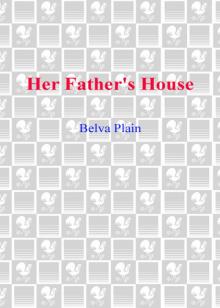 Her Father's House
Her Father's House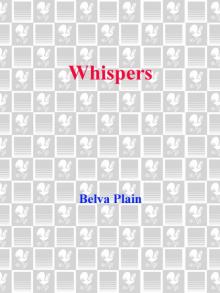 Whispers
Whispers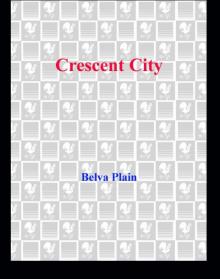 Crescent City
Crescent City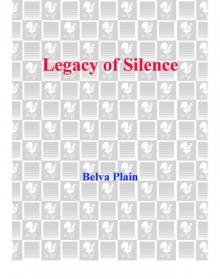 Legacy of Silence
Legacy of Silence Crossroads
Crossroads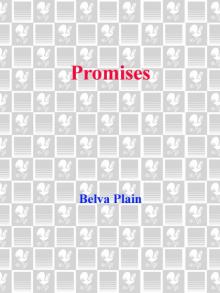 Promises
Promises After the Fire
After the Fire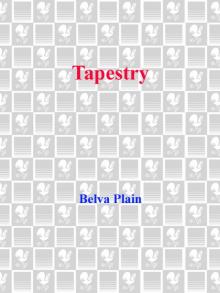 Tapestry
Tapestry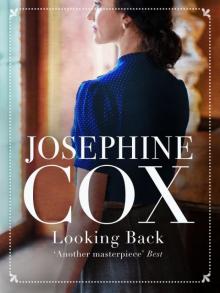 Looking Back
Looking Back Heartwood
Heartwood The Carousel
The Carousel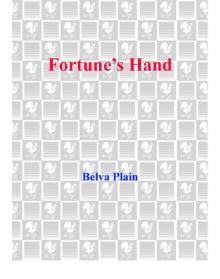 Fortune's Hand
Fortune's Hand Homecoming
Homecoming Random Winds
Random Winds Harvest
Harvest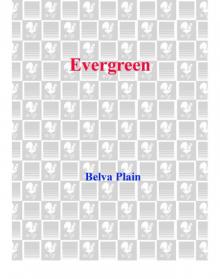 Evergreen
Evergreen Treasures
Treasures The Sight of the Stars
The Sight of the Stars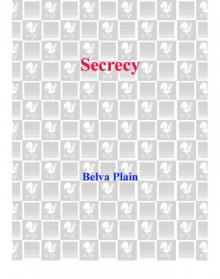 Secrecy
Secrecy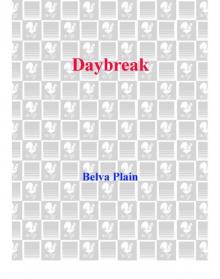 Daybreak
Daybreak Eden Burning
Eden Burning